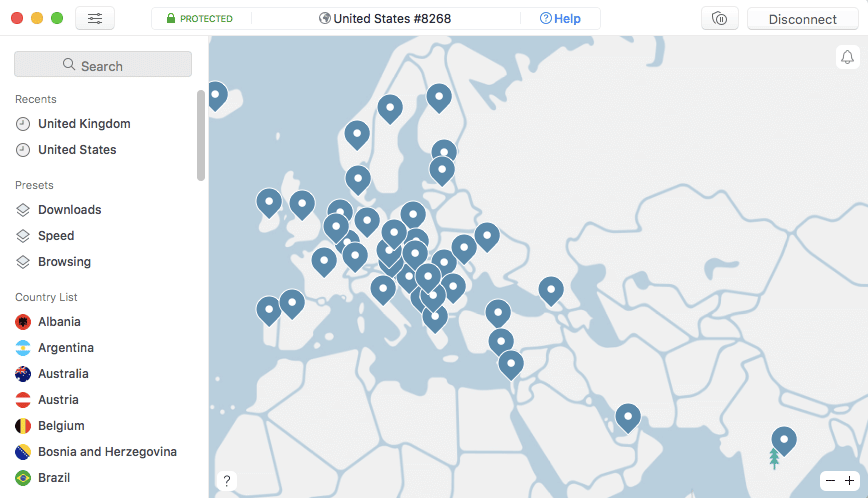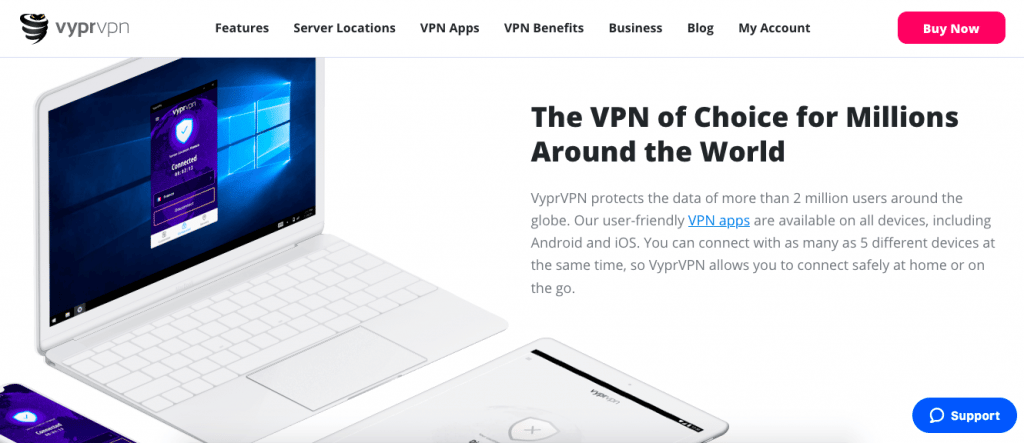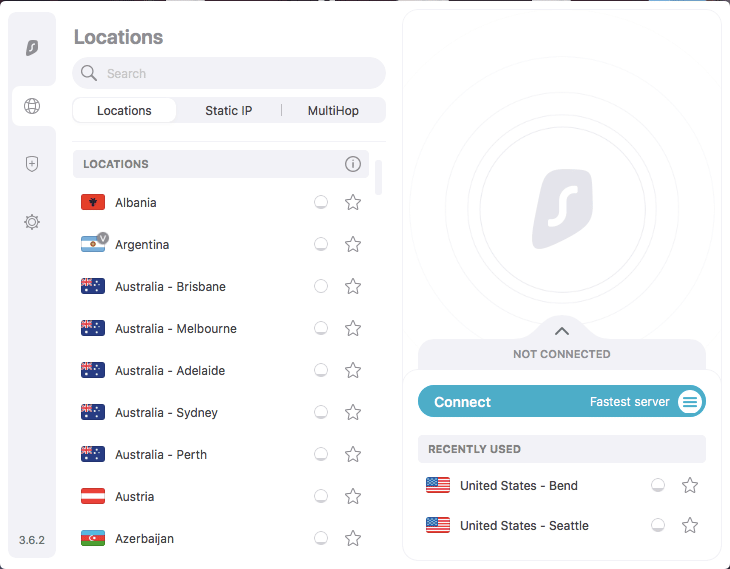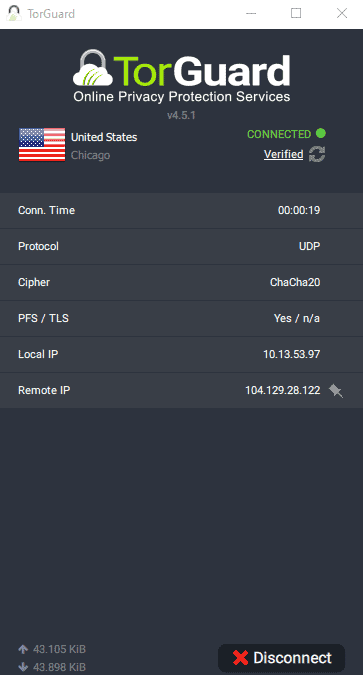
Best VPN for China in 2025: Beyond the Great Firewall
- Table of Contents
- Why You Need the Best VPN for China: The Great Firewall
- The Best VPN for China: Essential for Expats and Travelers
- The 7 Best VPNs for China
- 1. ExpressVPN
- 2. NordVPN
- 3. VyprVPN
- 4. Surfshark
- 5. TorGuard
- 6. AirVPN
- 7. Windscribe
- Does China Ban VPNs?
- Tips for Using a China VPN: Prepare Before You Come
- Conclusion: Best VPN for China
ExpressVPN is the best VPN for China. It’s fast, secure, and works in a majority of the country. However, I also recommend bringing at least three VPNs to China; NordVPN and VyprVPN are great backup choices. Try ExpressVPN for free with the 30-day money-back guarantee.
Why am I writing about the best VPN for China? We don’t have an article about the best VPN for Zimbabwe.
It’s because the Chinese government is the world’s leading innovator in online censorship, denying information to over a billion citizens. Freely exchanging information within China or across its borders is harder than beating Sun Tzu at Risk.
- Best for China
Since Mao Zedong came to power in the 1950s, the Chinese Communist Party (CCP) has feared that exposing its people to foreign ideologies weakens the party’s power. In the wake of Tiananmen Square, the unrest in Hong Kong and the atrocities suffered by the Uyghur people, the CCP is also concerned with keeping information that makes them look bad from getting out of China.
Are VPNs Legal in China?
Some Chinese businesses are allowed to use VPNs, but individuals are not allowed to use VPNs, though many do.Is it legal for foreigners to use a VPN in China?
Whether or not it’s actually legal is a gray area, but no foreign national has ever been prosecuted for using a VPN in China.Is Netflix banned in China?
Many foreign sites are blocked in China, and Netflix is one of them. The Communist Party likes to promote domestic equivalents to banned foreign sites; the “Chinese Netflix” is called IQIYI.What is the best free VPN to use in China?
None. I don’t trust any free VPNs to work consistently behind the Great Firewall. If you can afford a plane ticket to China, you can afford to pay for a VPN.Is ExpressVPN banned in China?
Technically, no, but its website is blocked. To use ExpressVPN in China, you have to download it before you arrive in the country.
Why You Need the Best VPN for China: The Great Firewall
Mao’s successor, Deng Xiaoping, once said that an open window allows in both fresh air and flies. Deng faced the challenge of how to open China to foreign business (the fresh air) without letting in ideas that would make people question his rule (the flies). His solution was the Great Firewall of China.
The old Great Wall wasn’t built out of nothing. It was created by closing the gaps between many walls that already existed. Similarly, the Great Firewall isn’t one thing, but an aggregate of policies and technologies put in place over three decades. China first connected to the internet in 1994, and ever since then, the government has been clamping down on it.
The Great Firewall takes many forms. A few of the most recognizable:
- Blocking access to outside web apps — including Google, Wikipedia, Twitter and Facebook — forcing Chinese citizens to use government-approved alternatives
- Demanding that foreign companies remove apps deemed subversive from their Chinese app stores
- Requiring foreign companies to follow local rules when doing business in China
- Banning personal VPNs for Chinese citizens
- Directly interfering with online search results
- Punishing citizens who are caught accessing subversive content
If you’re planning to visit China or relocate there permanently as an expat, all is not lost. China values its international reputation, so the CCP is reluctant to punish foreigners for violating its information laws. As of yet, no foreigner has been prosecuted for using a VPN in China (though I’ll make sure to update this article if that ever happens).
I’ve always said that everybody who uses the internet should use a VPN. But for those planning to visit China, I take the gloves off. You have to use a VPN. It’s not a suggestion; it’s a fact.
In this article, I’ll dive into why some VPNs can get you around the Great Firewall — and why some others can’t. Then I’ll share my top seven VPNs for using the internet freely in China.
The Best VPN for China: Essential for Expats and Travelers
Things weren’t always like this in China.
For a brief golden age — starting in about 1996 and ending with Xi Jinping’s ascension in 2012 — China developed a vibrant internet culture that regularly held the government accountable. But the Communist Party proved itself savvy with both tech and social media. While issuing new censorship orders, they also invested in more sophisticated technology.
Today, the Great Firewall (which the government prefers to call the Golden Shield Project) is the most advanced censorship system in history. If you’re in China, don’t expect to connect to Google, YouTube, Twitter, Facebook, Amazon Prime Video, Instagram, Gmail, WhatsApp, Netflix or Snapchat. And that’s just the tip of the iceberg.
How does the Great Firewall work? The key is that information from the outside world must pass through Chinese servers before reaching the end user. The government controls every entry and exit point, so they can see everything that goes in or out.
If a Chinese device requests to view Facebook, the request goes through a government-controlled DNS server, which sends it on to an invalid URL — a practice known as DNS poisoning. If you try to use a DNS server the government doesn’t own, you might find all of Facebook’s IP addresses blocked entirely.
The government can also inspect data packets sent to and from Chinese computers, as long as they’re not encrypted. If the Great Firewall catches anything sensitive, it can shut down the connection between those two computers.
Eagle-eyed readers might have spotted what I’m getting at here. The Great Firewall is one of the most complex machines ever built for the violation of human rights, but it has an Achilles’ heel. If you can hide your IP address and DNS requests, and encrypt all the data you send, it’s very difficult for it to touch you.
And what does both of those things? A virtual private network — a VPN.
How to Bypass the Great Firewall of China (Golden Shield Project)?
The Great Firewall can only target devices it knows are on Chinese soil. To get around it, you need to make it look like you’re not in China, then prevent it from following up to see if you’re lying.
When you connect to a VPN, you join a private, encrypted network of servers that masks your online activity from all onlookers. The encryption protects you as you run your web traffic through a server in another country, like Japan, South Korea or Vietnam (the closer you are, the better speed you’ll get). Learn more in the full VPN encryption guide.
By the time your request reaches the China-owned DNS servers, it’ll look like it came from an IP address the CCP has no authority over.
But there’s a catch. Several, actually. Not all VPNs are able to get past the Great Firewall without getting caught. Even if you find a VPN that works in China, there’s no guarantee it will work forever, or that it’ll work everywhere you go.
Now that you’ve got the context, it’s time to talk specifics. In the next section I’ll list seven VPNs you can trust to keep you connected and protected while you’re in China.
The 7 Best VPNs for China
Not all of these VPNs will work in China 100 percent of the time. The ugly truth is that there’s no guaranteed way through the Great Firewall. If there were, the CCP would have closed it by now.
Much like the fight between virtual private networks and streaming services, getting VPNs through the Great Firewall is an ongoing battle, with each side trying to adapt to the other side’s strategies. These seven VPN services have done the best job so far.
1. ExpressVPN
The Best VPN for China, and Also Everywhere Else

- Most reliable China VPN overall
- Great security & privacy records
- Extremely fast
- Expensive
- Relatively few simultaneous devices
- Some servers are virtual
ExpressVPN Stats:
- Price: $6.67 per month for a one-year subscription
- Money-back guarantee: 30 days
- Maximum devices supported: 8
- Website: expressvpn.com
ExpressVPN has achieved a rare feat: making enemies of both Netflix and the Chinese Communist Party. They haven’t yet teamed up to take it down, but that would make an awesome movie. And ExpressVPN would still win.
See, ExpressVPN is great at getting around security that tries to block VPNs. The Chinese government knows ExpressVPN is the most popular VPN among expats. On multiple occasions, they’ve tweaked the Great Firewall specifically to counter it.
And ExpressVPN still works in China.
Why ExpressVPN Is the Best VPN for China
If you really need to know anything else: ExpressVPN offers a selection of watertight security protocols. It’s one of the fastest VPNs, which is important if you’re going to connect to international servers. Its new Lightway protocol, an in-house version of WireGuard, combines speed and security for the perfect China VPN experience.
I’d like to reiterate a simple but profound truth: to be the best VPN for China, you have to work in China. ExpressVPN has done that for longer than any other service. Its real-world success is reflected in the number of expats who choose it. If you ask a seasoned foreign traveler in China what service they use, chances are they’ll recommend ExpressVPN.
Pricing is the big drawback to ExpressVPN. As the best VPN available, it doesn’t come cheap, especially month to month. The annual plan is a decent savings, but still comes in well above many competitors.
If you’re hesitant about spending the money, you can take advantage of ExpressVPN’s 30-day money-back guarantee. You can check out ExpressVPN’s pricing here as well as read my full ExpressVPN review, which has more information.
2. NordVPN
A User-Friendly, Nigh-Unbeatable China VPN

- Excels at unblocking sites
- Affordable
- User-friendly interface
- Cannot bypass Great Firewall in all locations
NordVPN Stats:
- Price: $3.67 per month for a two-year subscription, plus three months free
- Money-back guarantee: 30 days
- Maximum devices supported: 6
- Website: nordvpn.com
In this article, I’m talking about two separate measures of quality. Being a good VPN for China is the most important, but the service should also be, you know, a good VPN. Fortunately for users, NordVPN is both.
NordVPN has a lot in common with ExpressVPN. First, there’s its own version of WireGuard, called NordLynx. I’ve tested NordLynx heavily, and am confident in saying that it’s a secure VPN protocol that’s often the fastest of the lot.
Why NordVPN Is the Second Best Best VPN for China
Also like ExpressVPN, NordVPN has picked a personal fight with China. In this case, it hasn’t gone very well, which is why NordVPN is only second on this list. NordVPN bypasses the Great Firewall easily in some parts of the country, but in others, the censors have managed to restrict its use.
Given that patchwork quality, NordVPN makes a better choice as a backup VPN for China. If you’re in an area where ExpressVPN doesn’t work, NordVPN just might. Its long-term plans are also cheaper than ExpressVPN’s, especially if you sign up for two years.
You have the option for a refund using its 30-day money-back guarantee in case you change your mind. You can check out NordVPN’s pricing here as well as read my full NordVPN review, which has more information.
3. VyprVPN
Works Well in China, Thanks to Its Chameleon Protocol

- Chameleon protocol features best-in-class obfuscation
- Cheap three-year plan
- Regularly gets third-party privacy audits
- Speeds are not great
VyprVPN Stats:
- Price: $5 per month for a one-year subscription
- Money-back guarantee: 30 days
- Maximum devices supported: 10
- Website: vyprvpn.com
VyprVPN is a lesser-known VPN in the U.S., but among China visitors and expats, it’s got a strong reputation. That’s mostly owed to one thing: the Chameleon protocol.
Although The Chameleon Protocol may sound like a Robert Ludlum novel, it’s actually another proprietary VPN protocol, this time based on OpenVPN. Chameleon focuses on providing the best obfuscation layer possible — not only encrypting your traffic, but hiding the fact that you’re using a VPN at all.
I haven’t talked much about obfuscation yet, since it’s standard for any decent VPN. However, VyprVPN makes it so central to the brand that now seems like a good time to bring it up. Obfuscation refers to a second layer of encryption that also encodes metadata related to your internet connection. It’s essential for getting past security that looks for VPN traffic.
Why VyprVPN Is the Third Best VPN for China
Outside of the proprietary Chameleon protocol, VyprVPN is nothing special in this crowded VPN market. Its Switzerland-based team is strongly committed to the right to privacy, so it’s unlikely to cooperate with Chinese censors. It’s also got one of the cheapest plans of any VPN if you’re willing to subscribe for three years up front. Learn more in the full VyprVPN review.
My only real gripe is the speed. Depending on the server, using VyprVPN can make your browser sluggish. For me, though, the enhanced security of Chameleon is more than worth it. You can check out VyprVPN’s pricing here; like ExpressVPN and NordVPN, VyprVPN also comes with a 30-day money-back guarantee.
4. Surfshark
The Newest Star of the VPN Scene Has Already Shown Promise in China

- NoBorders mode designed to bypass restrictions
- Very affordable price
- Constantly expanding server network
- Has not been tested against the Great Firewall yet
- Not always easy to use
Surfshark VPN Stats:
- Price: $2.49 per month for a two-year subscription
- Money-back guarantee: 30 days
- Maximum devices supported: Unlimited
- Website: surfshark.com
Surfshark hasn’t been around long enough to cement its reputation as a good or bad VPN for China. However, what I’ve seen so far is sufficient to earn it a place on this list.
The main selling point for Surfshark as a China VPN is its “NoBorders” setting. Like VyprVPN’s Chameleon protocol, NoBorders is a sort of meta-VPN: a second layer of encryption that makes it look like you’re not even using a VPN.
The option to turn on NoBorders specifically mentions the Great Firewall, hinting that Surfshark is challenging China like ExpressVPN and NordVPN before it. So far, it’s worked well. The only reason I’m hesitant is that the Great Firewall hasn’t had time to target Surfshark personally yet. Once Surfshark proves it can handle a targeted attack, I expect it to climb higher up the list.
Why Surfshark Is Number Four on the Best VPNs for China List
Outside of security, Surfshark also offers low prices, fast browsing and useful features like a kill switch. Its server network is small, but growing fast, and it has locations in many countries near China — Japan, South Korea, Taiwan, Hong Kong, Singapore and others. My only real issue is the UI, which can sometimes be counterintuitive.
You can check out Surfshark’s pricing here — it also comes with a 30-day money-back guarantee — as well as read my full Surfshark review, which has more information about the VPN.
5. TorGuard
Not the Easiest to Use, but It Takes China Seriously

- Good range of Asia-Pacific servers
- Obfuscation system disrupts Great Firewall packet sniffers
- Consistently connects across China
- Lackluster pricing
- Confusing UI
- Connection speeds are uneven
TorGuard VPN Stats:
- Price: $5 per month for a one-year subscription
- Money-back guarantee: 7 days
- Maximum devices supported: 8
- Website: torguard.net
In 2018, TorGuard removed all its VPN servers from mainland China. The other VPNs on this list have also done that, but TorGuard’s blog post announcing the removal has a nice, clear explanation of the reasoning behind it.
Basically, if you put a VPN server in China, it has to follow China’s rules. That means logging data, blocking websites and generally going to bat for the Great Firewall. TorGuard’s refusal to comply proves its commitment to security.
Despite being unrelated to the famous anonymous browser, Tor (The Onion Router), TorGuard beats the Great Firewall with another example of advanced security technology. Its Stealth VPN, accessible to all users, is a sophisticated obfuscation solution that beats almost all the firewalls you’ll find across China.
Why TorGuard Is Number Five on the Best VPNs for China List
So why is it only number five? TorGuard has never been all that concerned with coddling its users. Compared to ExpressVPN, NordVPN or Surfshark, the interface is clunky and counterintuitive. TorGuard works well for China, but I wouldn’t recommend it for beginners.
If you don’t like the VPN, watch out: you only get a seven-day money-back guarantee. You can check out TorGuard’s pricing here.
6. AirVPN
A Good Choice for Security Enthusiasts, but Not Beginners

- Works in a vast majority of Chinese locations
- Very affordable
- Powerful security control options if you know how to access them
- Not geared toward beginners
- Very short refund window
AirVPN Stats:
- Price: $3.22 per month for a three-year subscription
- Money-back guarantee: 3 days
- Maximum devices supported: 5
- Website: airvpn.org
AirVPN is the hacker’s VPN. If you’re already familiar with security, you can tinker with it to your heart’s content to get your settings exactly how you like them.
For beginners, that’s a double-edged sword. AirVPN gives you a huge range of options for customizing your security and staying ahead of the Great Firewall. But it’s not particularly interested in helping you find them.
Why AirVPN Is Number Six on the Best VPNs for China List
By way of illustration: some VPNs give you access to multi-hop connections, which run your requests through two VPN servers before sending them to their destination. Almost all of these VPNs — including NordVPN — stop at two hops, but AirVPN goes up to five.
Sounds awesome, right? It is, until you realize that you can’t just ask for and receive five hops. The way AirVPN handles multi-hop, you have to set up a virtual machine for each layer. Pretty much all of AirVPN’s security features are like that — supremely powerful, but a lot of work.
If you’re willing and able to put in that work, though, your reward is a cheap VPN that works 99 percent of the time in China. Just make sure you’re ready for what AirVPN is putting out into the world. You can check out AirVPN’s pricing here or try it out with its seven-day money-back guarantee.
7. Windscribe

- Totally free for 10GB
- Build your own plan to save money
- Unlimited simultaneous connections
- Multi-hop connections & double VPN encryption
- No split tunneling
- Free plan limits data & locations
Windscribe Stats:
- Price: Free for 10GB per month; $4.08 per month for a one-year subscription
- Money-back guarantee: 3 days
- Maximum devices supported: Unlimited
- Website: windscribe.com
My usual refrain, when asked, is that you shouldn’t trust a free VPN in China. Windscribe is the only service for which I’ll make even a slight exception.
Windscribe is best known as a free VPN service, and it’s the best of the lot — its only real challenger is TunnelBear (which was an honorable mention for this list). However, you can only transmit 10GB of data per month through the VPN, and you lose access to a lot of its server locations.
It’s worth paying, in my opinion. Windscribe’s security stands up there with the best, featuring AES-256 encryption and a stealth VPN connection that obfuscates your data packets.
Why Windscribe Is Number Seven on the Best VPN for China List
You should be bringing at least three VPNs with you to China. Windscribe’s free plan could make a good last-resort backup if you can only afford two subscriptions. If Windscribe is your primary service, you’ll run out of data quickly unless you fork over some cash.
Don’t forget that you can build your own plan for $1 per location, each of which comes with an additional 10GB of data. One option is to get access to only two or three servers close to mainland China, saving money while ensuring a fast connection.
You can check out Windscribe’s free plan and pricing here or read the full Windscribe review to learn more.
Does China Ban VPNs?
It shouldn’t come as a surprise that the CCP has targeted VPNs. If a VPN service actually works, it can make censorship nearly impossible.
The Communist Party has to thread the needle, though, because a lot of Chinese businesses rely on VPNs. In order to keep letting in that fresh air while keeping out the flies, the Great Firewall can’t block VPNs altogether. China has kicked VPNs off its app stores and even fined its citizens for being caught with a VPN, but they can’t make them 100 percent illegal.
Making matters even more difficult for the Communist Party is the fact that they have no power over VPNs that are based outside China. A VPN founded and run within China can be shut down for failing to follow party rules, but if the VPN provider is headquartered in the British Virgin Islands, the CCP is SOL.
Finally, as I mentioned before, China is still nervous about upsetting foreigners. If an expat gets caught with a VPN, most officials will just shrug. Unless you’re a Chinese national, don’t worry about getting punished — just worry about your VPN not working.
Tips for Using a China VPN: Prepare Before You Come
Preparation is the key to successfully using the global internet in China. You never know what you’ll be able to get once you’re in the country, so before you go, you’d better have backups for your backups. These tips will help you get ready.
1. Download and install a VPN before you leave for China
The Great Firewall blocks the download pages for almost every VPN service on my list. Once you land, it’s too late to get your hands on a reliable VPN. You have to get your VPN app downloaded and tested before you go.
2. In fact, download several VPNs
One key trait of the Great Firewall that I haven’t yet mentioned is its inconsistency. The party oversees censorship in China, but leaves enforcement up to local bureaus, all of whom go about it in different ways. A VPN that works in Beijing may not work in Chongqing. To be safe, pick at least three VPNs to bring with you.
3. Subscribe for longer than you plan to stay
Again, you aren’t going to be able to get onto your favorite VPN’s website from mainland China. That means you won’t be able to renew your subscription if it lapses. Subscribing to a VPN for a longer term is a safer bet, and will save you money as well.
4. Follow the news
The CCP comes down harder on VPNs when it’s having a bad news cycle — or thinks it’s going to have one. For example, they put in overtime during the Hong Kong protests of 2020, making trouble for every VPN user in the country. If you’re having trouble connecting, it could be down to events outside your control.
5. Be patient when troubleshooting
If you can’t connect on your first attempt, try different servers. Try different protocols. Try using a different device. If you’re completely rebuffed, shift to another VPN service. And if none of them work, just wait. Remember that the Great Firewall is not consistent, even between two small villages.
Conclusion: Best VPN for China
I wish I had a crystal ball to see when the government of China will finally loosen its grip and grant freedom of expression to the people. Sadly, I don’t know when that will be. But until then, I’m at least comforted to know that foreign travelers have a trick they can use to stay ahead of the authorities.
Hopefully, this article has given you more confidence for your upcoming trip to China. When you’re there, use your favorite VPN to send me pictures of the real Great Wall.
And if you’ve got a favorite VPN for China that I didn’t mention, let me know in the comments. Thanks for reading!



Leave a Reply